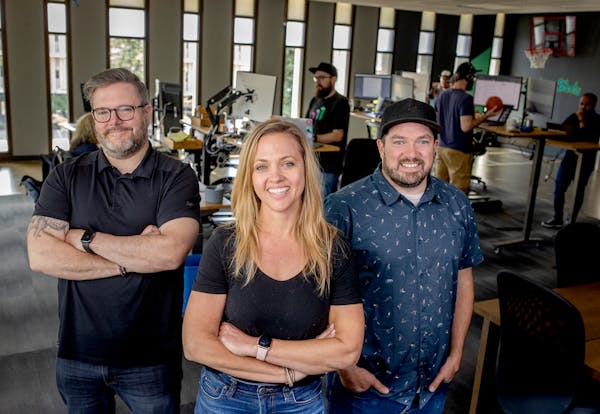In 2023, it took Sean Higgins close to eight months to raise $6 million from investors for his St. Paul software company, BetterYou.
In prior years — 2021 or 2022 — it would have taken half the time, he said.
For leaders of venture-backed companies, last year was a difficult time to raise capital as investors extended the due-diligence process. That was a sign they were overly cautious with their spending amid talks of a recession, federal interest rates hikes and rising inflation.
Last year, U.S. companies raised $170.6 billion from private investors, a drop of $71.6 billion from 2022 and down $177.4 billion from 2021, according to a report investment research firm PitchBook and the National Venture Capital Association released Thursday. Minnesota companies raised $1.2 billion through 172 deals, ending a three-year streak of exceeding $2 billion in investor capital raised. It was also the lowest amount raised since 2017.
Higgins, who announced his funding in December, initiated talks with roughly 200 investors. After 100 introductory meetings and 85 follow-up meetings, he proceeded into the diligence process with 11 investors. That led to five new investors, all from the Midwest, who invested in the company, he said.
"We probably would have had 30 percent to 40 percent higher valuation and those types of things [in previous years] versus where we were at in 2023," Higgins said.
In earlier years, companies were able to woo investors with numbers backing gains in market share or selling the dream of a company's potential based on the business model. In 2023, though, firms were more selective, spending their time vetting companies with better metrics around financial stability and profit, entrepreneurs and investors said.
That differentiator is what led to Northteq, a Minneapolis software company that expedites loan processing for equipment financers, receiving a $10 million investment from Arthur Ventures, a Minneapolis investment firm.
With speculation of a tough fundraising environment swirling, Northteq founder Kristian Dolan didn't initially seek outside capital for the company he's self-funded since it launched in 2020. He did, however, want a better understanding of growth options for his business. An M&A attorney recommended he talk with Arthur Ventures' partners "because he felt there was some synergies between the two", Dolan said.
Northteq was already profitable, and Arthur Ventures, which invests in early stage software companies, had raised $470 million for two new funds earlier in the year. Dolan didn't want to sell equity for the sake of raising money. He said he wanted to raise money with a partner that would funnel new resources into Northteq, which he found in Arthur Ventures.
"In a challenging market like now, raising funds is something to be appreciative of," he said.
Companies that achieved high growth during 2023 and exhibited capital efficiency continue to have fundraising success, Arthur Ventures partner Patrick Meenan said. Those that didn't saw little interest from new investors, he said.
Despite economic uncertainties, Minnesota-based funds like Arthur Ventures continued to invest last year. The firm deployed more than $200 million into companies that fit that high-growth profile, with $20 million going into Minnesota companies, Meenan said.
"There are certainly some investors that are sitting on their hands trying to wait it out," he said. "We personally believe that's not the right strategy because it's too hard to time the market, which is why we've stayed consistent."
Being consistent, and conservative, played a role in Rally Ventures — an early stage investment firm with offices in Menlo Park, Calif. and Minneapolis — closing on $240 million for its fifth fund in December, managing director Justin Kaufenberg said.
"Limited partners were looking for firms that had that type of discipline," he said.
PitchBook's experts see positive signals for increased fundraising in 2024, namely due to declining interest rates that will fuel more deal activity. Minnesota investors agreed, saying companies are feeling better after cutting costs to extend operations before needing more money.
"Now is the time to build a portfolio," said Reed Robinson, founder and partner of Minneapolis investment firm Groove Capital. Robinson anticipates deals moving faster this year, with fund managers making investments to appease their investors.
In 2024, Minnesota business owners seeking investor capital should consider only raising the money necessary to get them to their next major milestone.
"If you don't need $10 million, don't try to raise $10 million," Kaufenberg said.
Even with a profitable business, business owners should anticipate hearing plenty of "no's" in 2024, along with lengthier diligence procedures, Higgins and Robinson said.
A more frugal investing environment, though, could force good behavior among company leaders, Kaufenberg said.
"With less money to spend, you just naturally have to concentrate on being capital efficient," he said.
Here's a look at some of the largest capital Minnesota companies raised in 2023
- Health benefit provider Gravie in March announced $179M in growth capital.
- Relievant Medsystems, a maker of a system used to treat chronic low back pain, raised $50M in April.
- Flywheel raised $54M in June to develop its cloud-based research platform for researchers and pharmaceutical companies.
- Medical technology company Sonex Health closed on $40M in September.
- Radiopharmaceuticals maker Nucleus RadioPharma closed on $56M in October.
- Electric vehicle technology company Niron Magnetics closed on $33M in November.

Minnesota Department of Health rescinds health worker layoffs

Eco-friendly house on 30 acres near Marine on St. Croix listed at $1.6M

DOGE cuts federal money for upgrades at Velveeta plant in New Ulm

